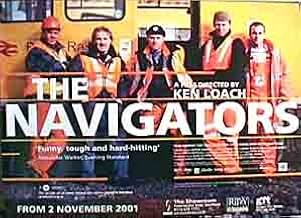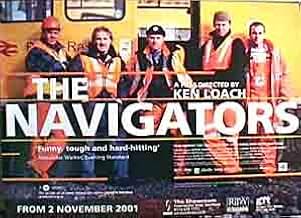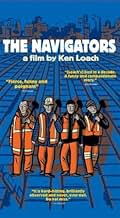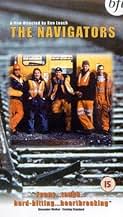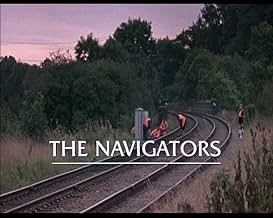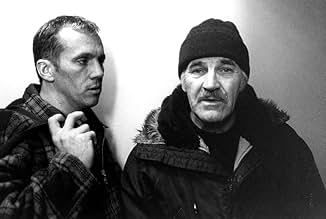The Navigators
- 2001
- Tous publics
- 1h 36m
IMDb RATING
6.9/10
3.2K
YOUR RATING
Five Yorkshiremen try to survive after the British Rail is bought out by a private company.Five Yorkshiremen try to survive after the British Rail is bought out by a private company.Five Yorkshiremen try to survive after the British Rail is bought out by a private company.
- Won 1 BAFTA Award
- 3 wins & 3 nominations total
Thomas Craig
- Mick
- (as Tom Craig)
Angela Forrest
- Tracy
- (as Angela Saville)
- Director
- Writer
- All cast & crew
- Production, box office & more at IMDbPro
Featured reviews
England. Mid 1990's. British Rail has been privatised and broken up into separate companies with all work put out to tender with the lowest bidder getting the job. This film follows a group of workers in a Yorkshire depot as the culture gradually changes from a world of union influence into a competitive business world.
This is a very sobering film - it deals with the railtrack situation but is more generally about the selling out of the working man and the beginning of the culture that views people as commodities and expenses, just like the rolling stock and the rails. The film opens with the boss of the depot announcing that the company has been privatised and that things will begin to change. It then follows the culture change over the course of time and concludes with a depressingly innocuous exchange that represents the shattering of previously unified spirits.
The culture change beings with mission statements, competing with work and setting levels for "acceptable deaths and continues with an end to previous agreements and a range of different companies. It is very hard to watch without being angry at the treatment of previously proud men as they are reduced to being costs. Workers are offered voluntary redundancy and those that refuse are gradually forced out. Bosses and chief execs identify those workers that have union ties and work to push them out. Workers are encouraged to join temp agencies at higher wages but without benefits or a steady work load thus saving the company money. Those that make trouble with the crews by insisting on safe working conditions etc are blackballed by the agencies and no more work is put their way. The pressure to cut costs to win jobs continues until unskilled workers are used for rail maintenance because they are paid cash in hand while other crews are forced to use "cost-effective" methods to work without a lookout and run the risk of severe accidents.
For those who think that the experiences of the workers are exaggerated for effect, Ken Loach received regular visits from railtrack workers (taking holidays or sick days) to advise on the film to make sure that it was representative of their experiences - they couldn't officially do it as they feared being blacklisted within the company. These things do go on - the rail companies are led by bosses who get huge bonuses from the shareholders as they drive down operating costs by compromising safety and reducing the workforce costs.
If the film has a major flaw it is the one-sided nature of the script. Workers are all represented as jovial, hardworking types, you know - salt of the earth, put down by bosses who only care about money. The latter may well be true but the way the workers constantly joke etc makes them look too good and the film has far too much sympathy for them for it's own good. Even when a group of workers do something completely abhorrent (the end of the film) it is presented as something that they had no choice about whereas really they should have carried some of the blame.
This film was released in Europe but only had a limited release in the UK as it was screened first on TV. It came shortly after the collapse of Railtrack as the Government put it into administration. It was screened days after the Government tried to cover up a report of failing train performances etc and it was screened as inquiries continue into serious derailments with significant loss of life.
In the UK one major accident killed many passengers and was put down to badly maintained rails. The Chief Exec has thus far escaped charges of manslaughter (despite the findings of the Health & Safety Executive) and also left his job with his huge contractually-obliged bonus, before moving on to another job on another board. For those who think that this film is exaggerated you truly have no idea what's going on in the world of big business.
As the Government continue plans for part privatisation of the London Underground and have further plans to privatise air traffic control this film is a very scary thing. Once we forget the people who make up workforces that only leave numbers. When shareholders become more important than the public and the workers then costs are all that matters and all corners are cut to boost the share price.
This film has it's flaws and will not change Government policy one bit. But this is a very sobering film that will open you eyes to what is done to satisfy shareholders and earn bonuses for upper management.
This is a very sobering film - it deals with the railtrack situation but is more generally about the selling out of the working man and the beginning of the culture that views people as commodities and expenses, just like the rolling stock and the rails. The film opens with the boss of the depot announcing that the company has been privatised and that things will begin to change. It then follows the culture change over the course of time and concludes with a depressingly innocuous exchange that represents the shattering of previously unified spirits.
The culture change beings with mission statements, competing with work and setting levels for "acceptable deaths and continues with an end to previous agreements and a range of different companies. It is very hard to watch without being angry at the treatment of previously proud men as they are reduced to being costs. Workers are offered voluntary redundancy and those that refuse are gradually forced out. Bosses and chief execs identify those workers that have union ties and work to push them out. Workers are encouraged to join temp agencies at higher wages but without benefits or a steady work load thus saving the company money. Those that make trouble with the crews by insisting on safe working conditions etc are blackballed by the agencies and no more work is put their way. The pressure to cut costs to win jobs continues until unskilled workers are used for rail maintenance because they are paid cash in hand while other crews are forced to use "cost-effective" methods to work without a lookout and run the risk of severe accidents.
For those who think that the experiences of the workers are exaggerated for effect, Ken Loach received regular visits from railtrack workers (taking holidays or sick days) to advise on the film to make sure that it was representative of their experiences - they couldn't officially do it as they feared being blacklisted within the company. These things do go on - the rail companies are led by bosses who get huge bonuses from the shareholders as they drive down operating costs by compromising safety and reducing the workforce costs.
If the film has a major flaw it is the one-sided nature of the script. Workers are all represented as jovial, hardworking types, you know - salt of the earth, put down by bosses who only care about money. The latter may well be true but the way the workers constantly joke etc makes them look too good and the film has far too much sympathy for them for it's own good. Even when a group of workers do something completely abhorrent (the end of the film) it is presented as something that they had no choice about whereas really they should have carried some of the blame.
This film was released in Europe but only had a limited release in the UK as it was screened first on TV. It came shortly after the collapse of Railtrack as the Government put it into administration. It was screened days after the Government tried to cover up a report of failing train performances etc and it was screened as inquiries continue into serious derailments with significant loss of life.
In the UK one major accident killed many passengers and was put down to badly maintained rails. The Chief Exec has thus far escaped charges of manslaughter (despite the findings of the Health & Safety Executive) and also left his job with his huge contractually-obliged bonus, before moving on to another job on another board. For those who think that this film is exaggerated you truly have no idea what's going on in the world of big business.
As the Government continue plans for part privatisation of the London Underground and have further plans to privatise air traffic control this film is a very scary thing. Once we forget the people who make up workforces that only leave numbers. When shareholders become more important than the public and the workers then costs are all that matters and all corners are cut to boost the share price.
This film has it's flaws and will not change Government policy one bit. But this is a very sobering film that will open you eyes to what is done to satisfy shareholders and earn bonuses for upper management.
10Jose E
This is by no means a movie to be seen for pure entertainment,. This is a REALISTIC movie, so those looking for kicks stay away. Otherwise you will be so disappointed.
I like this movie so much, especially since is the type of movie Hollywood would NEVER make. It sharply portraits how bad working conditions have gotten over the years (which is something I have witnessed firsthand). Treating people like dirt and firing them without a reason have become an end it itself.
Watching this film takes you to the core of what's going on at most workplaces, which obviously won't delight those who think life is pretty, because it ain't. Put your feet on the ground and search for that beauty - you are not going to find it in the treatment workers are getting anywhere. This is the real world, people, whether we like it or not.
While seeing this movie, never did I feel I was in the cinema. I could relate to what the characters were going through.
Of course the movie has no happy end, but if it did would be unreal.
10/10.
I like this movie so much, especially since is the type of movie Hollywood would NEVER make. It sharply portraits how bad working conditions have gotten over the years (which is something I have witnessed firsthand). Treating people like dirt and firing them without a reason have become an end it itself.
Watching this film takes you to the core of what's going on at most workplaces, which obviously won't delight those who think life is pretty, because it ain't. Put your feet on the ground and search for that beauty - you are not going to find it in the treatment workers are getting anywhere. This is the real world, people, whether we like it or not.
While seeing this movie, never did I feel I was in the cinema. I could relate to what the characters were going through.
Of course the movie has no happy end, but if it did would be unreal.
10/10.
I was lucky to see during the festival of Venice in Milan this very recent film from the good "social" director Ken Loach.
A group of friends in 1995 work in the Yorkshire for the ex-state owned: British Rail, which meanwhile has been completely fragmented in a tremendous number of small private companies that compete one against the other in order to be more competitive and gain the different bids. This situation leads the whole structure of each private company to a very profitable organisation offering a very poor service that has to save money from any single item of the fixed/variable costs structure of the economic statement.
Loach this time points out the lost of the social benefits of the labour class in a blackmail black and white situation where, if they want to get the job, they have to leave with these conditions which do not guarantee any type of social and physical safety to the worker.
It is not by chance that England has been the frame of several train accidents during the last years.
Unions are getting weaker and weaker and the so called "trouble makers" are led to leave the companies. The whole film is nicely viewed with some very fine, pretty uncommon in previous Loach's films, British humour. The scene where the supervisor has to read to the workers the message from the top management of productivity and their new rights is hilarious and superbly performed.
Rating: 6/10
A group of friends in 1995 work in the Yorkshire for the ex-state owned: British Rail, which meanwhile has been completely fragmented in a tremendous number of small private companies that compete one against the other in order to be more competitive and gain the different bids. This situation leads the whole structure of each private company to a very profitable organisation offering a very poor service that has to save money from any single item of the fixed/variable costs structure of the economic statement.
Loach this time points out the lost of the social benefits of the labour class in a blackmail black and white situation where, if they want to get the job, they have to leave with these conditions which do not guarantee any type of social and physical safety to the worker.
It is not by chance that England has been the frame of several train accidents during the last years.
Unions are getting weaker and weaker and the so called "trouble makers" are led to leave the companies. The whole film is nicely viewed with some very fine, pretty uncommon in previous Loach's films, British humour. The scene where the supervisor has to read to the workers the message from the top management of productivity and their new rights is hilarious and superbly performed.
Rating: 6/10
Although it contains some funny moments, this film is no comedy; rather it is a biting satire of the mess that resulted when the Conservative Government in the UK decided to split up and privatise British Rail in 1995 (one wonders why they didn't go all the way and do the same to the highways) as seen through the eyes of track workers. Perhaps the most ludicrous moment is when their supervisor in their newly created regional private company tells the workers to take equipment out to dump bins and smash it up because "it isn't up to scratch, we've got to have high standards now." "But it's perfectly good, can't we sell it?" they protest. "What, sell it to the competition?" is the response. Later they are told that management's streamlining (making staff redundant) has been too successful: they are now too small to be viable and the depot has to close, the rest of the workers have to go. Aside from the almost documentary of the plight of Britain's rail network, there are personal interactions between the working class characters in their daily lives that viewers can empathise with. In all it's well cast, well scripted and well directed.
I saw the movie today. It is good to know that while in Hollywood the so called entertainment industry wants to send our minds and conscious into sleep, comes a real humanist film maker and serves as a voice of society in a crisis, of real people like all of us that deal with problems that surface everywhere in the world. How men can survive and remain human and moral while fighting in vain in every establishment, including ones that suppose to help the individual. It is not just a Marxist manifesto but rather a compassion, loving, caring and worried look at a group of people that want to survive in a world that is changing rapidly economically and morally. You'll laugh with them, get frustrated with them and feel pity for them when they make the wrong choice (if such a thing can be defined). As always with Loach's films, it's so reliable that you immediately feel that the characters are a part of your life and there are no actors and no movie - just a look at familiar people who struggle to keep their jobs against a system that doesn't really care for its human resources and by that hurt them and herself. It is really touching and heart-tearing as much as loving with even quite a lot bits of humor which make it more credible. A real must!
Did you know
- GoofsThe vest that John wears in the beginning (with the meter) and end (their last job), is actually a British Rail safety vest, over his Gilchrist coat (when he moves you can see the gray on it). He has the combination on before the company is renamed Gilchrist Engineering.
- ConnectionsReferenced in Il était une fois...: Moi, Daniel Blake (2021)
- How long is The Navigators?Powered by Alexa
Details
- Release date
- Countries of origin
- Official sites
- Language
- Also known as
- Demiryolcular
- Filming locations
- Production companies
- See more company credits at IMDbPro
Box office
- Gross US & Canada
- $3,052
- Opening weekend US & Canada
- $1,940
- Feb 23, 2003
- Gross worldwide
- $1,807,686
- Runtime
- 1h 36m(96 min)
- Color
- Sound mix
- Aspect ratio
- 1.85 : 1
Contribute to this page
Suggest an edit or add missing content

